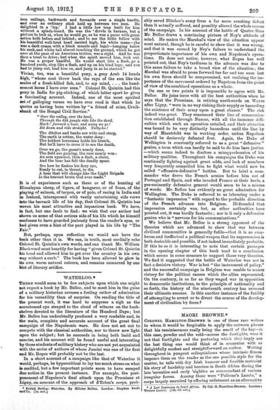WATERLOO. *
THERE would seem to be few subjects upon which one might not expect a book by Mr. Belloc, and to meet him in the guise of a military historian arouses a feeling rather of admiration for his versatility than of surprise. On reading the title of the present work, it was hard to suppress a sigh as the accustomed eye strayed to the cloud of witness on the book- shelves devoted to the literature of the Hundred Days ; but Mr. Belloc has undoubtedly produced a very readable and, in the main, complete and accurate account of the great final campaign of the Napoleonic wars. He does not set out to compete with the classical authorities, nor to throw new light upon the subject ; but he succeeds in being both lucid and concise, and his account will be found useful and interesting by those students of military history who are not yet acquainted with the series of authors of whom Jomini was one of the first and Mr. Ropes will probably not be the last.
In a short account of a campaign like that of Waterloo it would, perhaps, be hypercritical to lay too much stress on what is omitted, but a few important points seem to have escaped due notice in the present instance. For example, the post. ponement of Napoleon's final attack upon the Prussians at Ligny, on account of the approach of d'Erlon's corps, prob- • British Battles: Waterloo. By Hilaire Bello°. London: Stephen Swift and Co. [Is. net.]
ably saved Blucher's army from a far more crushing defeat than it actually suffered, and possibly altered the whole course of the campaign. In his account of the battle of Quatre Bras Mr. Belloc draws a convincing picture of Ney's attitude of mind. He makes the Marshal's view of the situation appear most natural, though he is careful to show that it was wrong, and that it was caused by Ney's failure to understand the proportionate importance of his own and Napoleon's opera- tions. He does not notice, however, what Ropes has well pointed out, that Ney's tardiness in the advance was due to this same failure to take a broad view of the situation ; the Marshal was afraid to press forward too far and too soon lest his own force should be compromised, not realizing the im- portance of the movement ordered by Napoleon from the point of view of the combined operations as a whole.
On one or two points it is impossible to agree with Mr. Belloe. He joins issue with all the best authorities when he says that the Prussians, in retiring northwards on Wavre after Ligny, "were in no way risking their supply or hazarding the existence of their army upon a great chance." The risk indeed was great. They renounced their line of communica- tion established through Namur, with all the immense diffi- culties which such an operation entailed, and their situation was bound to be very distinctly hazardous until the line by way of Alaestricht was in working order, unless Napoleon should be decisively defeated first. Again, the Duke of Wellington is constantly referred to as a great " defensive " genius, a term which can hardly be said to do him bare justice —which seems indeed to disclose a misapprehension of his military qualities. Throughout his campaigns the Duke was continually fighting against great odds, and lack of numbers very frequently compelled him to fight what would now be called "offensive-defensive" battles. But to label a com- mander who drove the French armies before him out of Portugal and Spain, and who invaded France at their heels, a pre-eminently defensive general would seem to be a misuse of words. Mr. Belloc has evidently no great admiration for Wellington. The Duke is referred to as labouring under a "fantastic impression" with regard to the probable direction of the French advance into Belgium. Ill-founded that impression certainly was, but, as other authorities have pointed out, it was hardly fantastic ; nor is it only a defensive genius who is "nervous for his communications."
We believe that Mr. Belloc is a strong opponent of the theories which are advanced to show that war between civilized communities is generally futile—that it is so cum- brous and ineffectual a political weapon that its supersession is both desirable and possible, if not indeed immediately probable. If this be so it is interesting to note that certain passages in the opening chapter of this book tend to a conclusion which seems in some measure to support those very theories. We find it suggested that the battle of Waterloo was not in fact a decisive victory. War is but " the instrument of policy," and the successful campaign in Belgium was unable to secure victory for the political causes which the allies represented. On the contrary, in so far as they waged war in opposition to democratic institutions, to the principle of nationality and so forth, the history of the nineteenth century has reversed their ultimate success. Is this another instance of the futility of attempting to arrest or to divert the course of the develop- ment of civilization by force P


































 Previous page
Previous page